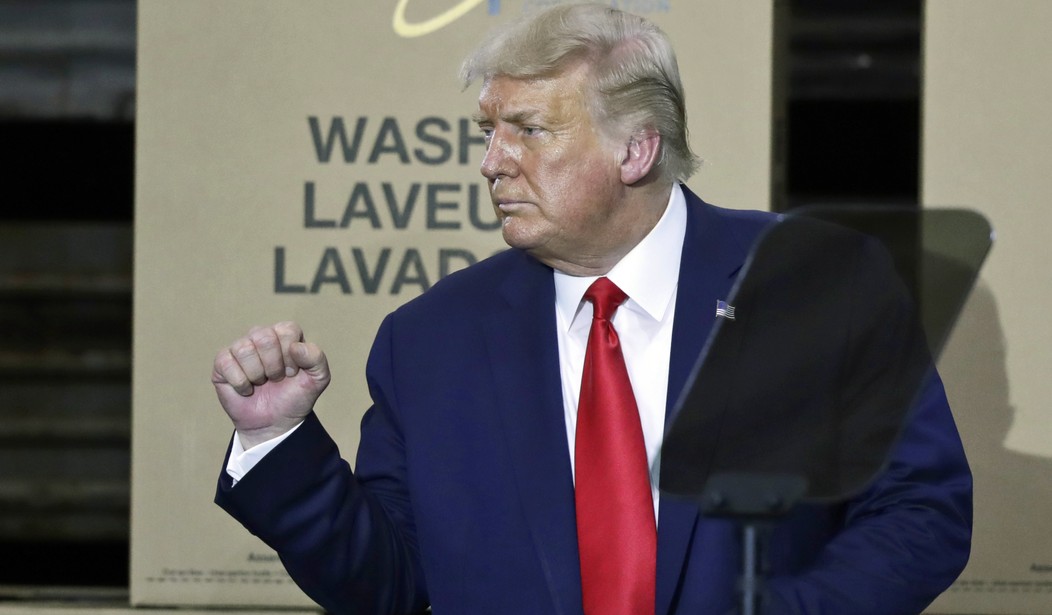Speaking at the Whirlpool Manufacturing Plant in Clyde, Ohio, on Thursday, President Donald Trump once again articulated the guiding principle of his administration: “The duty of a president is to put this nation’s own citizens first. That’s why my administration swears by two simple, but crucial rules, buy American and hire American.” His twilight struggle with the Democrats over the future of the nation, or whether the nation will even have a future at all, is coming down to the question of whether that principle will be upheld and defended, or consigned forever to the dustbin of history.
Trump drew the battle lines sharply at Whirlpool, charging that “on the question of foreign trade, previous leaders were guided by a shameful policy of capitulation, submission, and retreat…. For decades, you watched as politicians let foreign nations steal our jobs, loot our factories, and plunder the crown jewels of the US economy….For eight years, Whirlpool begged the Obama-Biden administration who did nothing to protect American workers from the flagrant dumping of foreign washers, dryers into America. But your cries for help fell on deaf ears. You didn’t see any action. They didn’t act, they didn’t care, and they never will.”
They didn’t care because they were among the beneficiaries of the pole-axing of American workers and the outsourcing of American industries. And it has been known for decades. That noted economist Sid Vicious sang back in 1977 about “a cheap holiday in other people’s misery,” and the leftist establishment moved quickly from cheap holidays in other people’s misery to cheap labor in other people’s misery. The labor is cheaper outside the United States, so American workers had to lose their jobs to provide low prices for rich and powerful socialist internationalists. Another farsighted economist, Bob Dylan, noticed this in 1983, singing about a woman in Brazil crafting furniture for import into the United States and “bringin’ home thirty cents a day to a family of twelve, you know, that’s a lot of money to her.”
This has been a struggle for practically as long as there has been a United States. The new book Rating America’s Presidents: An America-First Look at Who Is Best, Who Is Overrated, and Who Was An Absolute Disaster details how the struggle between advocates of free trade and the supporters of high tariffs has been the key element of numerous presidential elections, including that of 1888, when the Republican platform declared: “We are uncompromisingly in favor of the American system of protection. We protest against its destruction, as proposed by the President and his party. They serve the interests of Europe; we will support the interests of America.” Republican marchers held aloft banners saying that Democratic candidate Grover “Cleveland Runs Well in England” and “We Are Not Going to Vote Away Our Wages.” They argued that lowering tariffs would mean the end of American prosperity. Although the Republican candidate Benjamin Harrison won the election, this message didn’t exactly resonate with the American voter, who was also hearing from the Democrats that low tariffs would mean low prices.
In his speech at the Whirlpool plant, however, Trump pointed out that the consumer benefit of free trade and American workers getting undercut by foreign competitors who would work for less money was temporary: “Washington,” he said, “stood idly by as other countries engaged in unfair trade practices such as massive subsidies, currency manipulation, and in the case of your industry and your company, the wholesale dumping of foreign made product sold below cost for the sole purpose of driving you out of business so they could give us product at double, triple, and quadruple the price.”
The truth of this statement is clear in the fact that, as Rating America’s Presidents shows, the nation has generally prospered when tariff rates were high and American industries protected, and the lowering of tariffs has often led to economic downturns. Consumer goods may cost less, but Americans who are unemployed because their factory has moved to China or Mexico don’t have the money to pay for them even though they’re cheap. High tariffs mean jobs, which means prosperity. And a moment’s reflection should make it clear that whether the people who hire you and supervise you and pay your wages live around the corner (and hence know you and your circumstances) or halfway around the world (and neither know nor care about what you’re dealing with) makes a massive difference in the quality of your life.
In light of all this, and of the issue of border security as well, the 2020 election is shaping up to be a referendum on American independence. Will the United States continue as a free and independent nation? Or will it continue to degenerate and weaken until it is nothing more than a cog in the globalist multinational conglomerate, its citizens impoverished while the elites enjoy those cheap holidays on other people’s misery?
Robert Spencer is the director of Jihad Watch and a Shillman Fellow at the David Horowitz Freedom Center. He is author of 21 books, including the New York Times bestsellers The Politically Incorrect Guide to Islam (and the Crusades) and The Truth About Muhammad. His latest book is Rating America’s Presidents: An America-First Look at Who Is Best, Who Is Overrated, and Who Was An Absolute Disaster. Follow him on Twitter here. Like him on Facebook here.










Join the conversation as a VIP Member